FREDERICTON — The Green Party in New Brunswick is promising to end "deep poverty" by providing a guaranteed income to impoverished residents if elected to govern the province on Oct. 21.
Leader David Coon said Monday the ambitious program would be introduced within the first four years of his party's mandate.
"The social assistance system keeps people trapped in poverty, holding them back and keeping our province from reaching its potential," Coon said in a statement. "It’s time to try something new."
But it remains unclear how much such a commitment would cost. The statement did not provide details.
According to the Green Party's platform, the program would require funding from the federal government. As well, the document says it "would take some time to design properly," which means the funding wouldn't be available until 2028-29 at the earliest.
In the meantime, a Green government would raise social assistance rates by 20 per cent until the guaranteed income program is in place.
Meanwhile, the Liberals promised to impose a three per cent cap on rent increases in 2025 if elected to govern. Liberal Leader Susan Holt released a statement saying rents across New Brunswick had risen by about 10 per cent this year alone. The cap would be reviewed annually and could be changed based on inflation and vacancy rates, she added.
"Too many New Brunswickers are finding it harder and harder to afford a place to live,” Holt said. "For years, the … Conservatives have ignored the housing crisis, allowing rents to soar while families struggle to make ends meet."
In response, the incumbent Progressive Conservatives said rent caps have been discredited by numerous economists.
"Even though Susan Holt admitted … that most landlords are delivering 'reasonable' rent increases, she's chosen an easy talking point instead of tackling a complex policy issue," the Tory party said in a statement.
"New Brunswickers need results, not slogans."
The Conservatives noted that they have introduced amendments to the Residential Tenancies Act to give the residential tenancies tribunal the power to phase in rent increases in some scenarios, making sure changes are in line with the consumer price index.
Earlier in the day, Tory Leader Blaine Higgs focused on health care by pledging to expand the scope of practice of nurse practitioners, registered nurses, registered psychiatric nurses, paramedics and pharmacists. But the party did not provide details, saying it would work with medical professionals and their governing bodies to "evaluate all scopes of practice."
"Being able to see a qualified health-care professional quickly is key to effective health care," Higgs said in a statement. "But that doesn’t always need to be a doctor."
On another front, a New Brunswick election poll indicates the provincial Liberals are leading the incumbent Tories by a small margin in voting intentions, but when the margin of error is factored in, the parties appear to be in a very tight race. The results from the Mainstreet Research poll, released as the campaign began Thursday, were drawn from an automated telephone survey of 609 adults between Sept. 15 and Sept. 17.
The poll suggested the Liberals had support from 35 per cent of those surveyed, just ahead of the Tories at 32 per cent. The Green Party had 10 per cent and the People's Alliance party was a distant fourth at three per cent. All other parties, including the NDP, were at two per cent, and undecided voters made up 18 per cent of the results.
The poll, commissioned by Mainstreet, has a margin of error of plus or minus four percentage points with a 95 per cent confidence level.
Even when undecided voters were removed from the sample, the Liberals and Tories were only two points apart, and support for the Greens jumped to 13 per cent.
As for the party leaders, when respondents were asked their opinion of Progressive Conservative Leader Blaine Higgs, 51 per cent said they held a very or somewhat unfavourable view. Another 11 per cent said they didn't know, with the remainder (37 per cent) saying their opinion of Higgs was very or somewhat favourable.
In general, respondents had a more positive opinion of Holt, with 46 per cent saying their view was very or somewhat favourable, and another 31 per cent saying their opinion of her was very or somewhat unfavourable. Twenty-three per cent said they didn't know.
Still, the Conservatives received some positive news when respondents were asked whether they supported the Tory government's decision last year to amend its school policy for sexual orientation and gender identity, also known as Policy 713. The new directive requires teachers to get parental consent before they can use the preferred first names and pronouns of students under 16 years old.
In all, 50 per cent of those surveyed said they supported the change, while 35 per cent were opposed, and the remainder did not have an opinion.
This report by The Canadian Press was first published Sept. 23, 2024.
The Canadian Press



